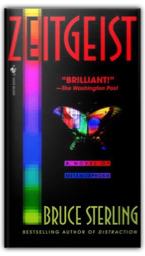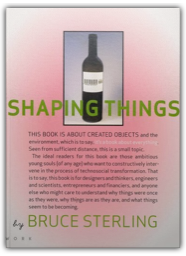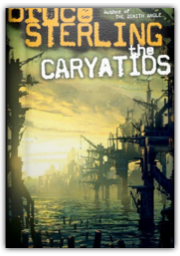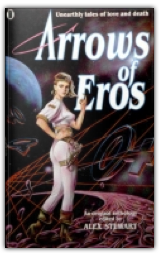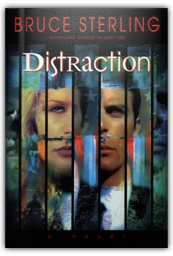 Distraction
Bruce Sterling
Distraction
Bruce Sterling
Politics is the art of the possible, the "doable", as Sterling's skewed hero, Oscar Valparaiso, keeps calling his wild improvised plans as if saying the word made them so. Oscar's usually successful schemes are as cobbled together as his own genetics—Oscar is not quite human. Investigating a genetic research facility for a Senate committee, he finds a potential power base, and an enemy worth his attention—the Governor of Louisiana has taken to conquering federal facilities using gangs of the homeless as his deniable mercenaries, and his interest in biotech makes the genetically anomalous Oscar, and the scientist he has fallen for, attractive acquisitions. Having a senator he has just help get elected go stark mad, and finding himself on the Net-wide hit list of every nut with a grudge, are the sort of things with which Oscar copes all the time—love and other altered states of consciousness are a bit more of a problem. Endless witty extrapolations of social and scientific paradoxes and a constant cheeky elaboration of already convoluted plot lines give this the brio of Sterling's best short fiction—if there is a more entertaining near-future SF novel this year, we will be in luck. —Roz Kaveney 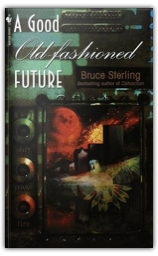 A Good Old-Fashioned Future
Bruce Sterling
A Good Old-Fashioned Future
Bruce Sterling
This is a paperback collection of seven short stories by former cyberpunk guru turned socio/cultural prognosticator Bruce Sterling. Most of the works here come with impressive pedigrees, ranging from a Hugo Award for "Bicycle Repairman" to Hugo nominations for "Maneki Neko" and "Taklamakan". Another piece, "Big Jelly", was co-written by Sterling's fellow cyberpunk, Rudy Rucker. 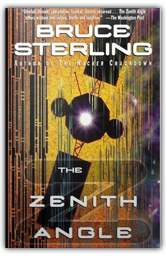 The Zenith Angle
Bruce Sterling
The Zenith Angle
Bruce Sterling
The Zenith Angle, futurist Bruce Sterling's first novel since Zeitgeist, tells the story of Derek "Van" Vandeveer. As the story opens, Van sits peacefully at his breakfast table enjoying life as a new homeowner and happily married man, with a new son and a fortune in stock options. Then the morning news reports a jetliner has crashed in nearby Manhattan—colliding with the World Trade Centre. Like many other Americans' lives, Van's will never be the same. He leaves his corporate job to work fighting terrorism for the US government. He soon finds himself sequestered at a top-secret undisclosed location while his fortune vanishes, his former company sinks into a morass of lawsuits and arrests, and his wife and son move to the far side of the country. As Van is transformed from cyber-whiz to spook, he finds himself changing in ways he would never have imagined. —Cynthia Ward, Amazon.com  Earth Abides
George R. Stewart
Earth Abides
George R. Stewart
Generally regarded as the classic tale of life struggling on after a global disaster, Earth Abides (1949) was George R. Stewart's only venture into SF. Before the first page the human race has been almost completely wiped out by plague. Our hero Isherwood "Ish" Williams discovers a female survivor and fumblingly tries to bring up a new civilization in the ruins of California. It's an elegiac story of loss as humanity makes it through the crisis, at the cost of our race's painfully gathered knowledge—which seems irrelevant to the new generations as they develop a hunter-gatherer society reminiscent of the old Amerindian tribes, and see no practicality in the fabulous tales of the old days told them by Ish. His nickname is deliberately reminiscent of Ishi, the once famous Californian Indian who was also the last of his tribe and became a misfit in a new world, in his case early 20th-century America. Annoyingly for fans of survivalist SF who reckon civilization can be rebuilt in about a month with a Swiss army knife, Earth Abides proposes that the cycle of regrowth will take significant time ... but there is always time. Stewart's title and epigraph echo the Book of Ecclesiastes: "Men go and come, but Earth abides." One of the sadder, gentler Millennium SF Masterworks reissues. —David Langford |
 Made with Delicious Library
Made with Delicious Library
London, State zipflap congrotus delicious library Scott, Mike





